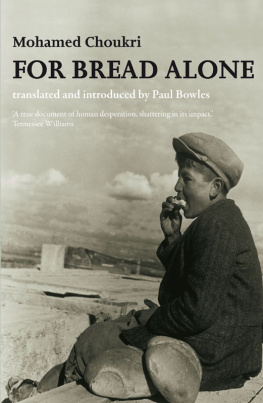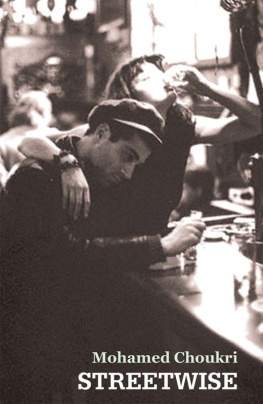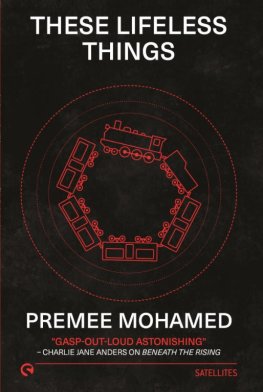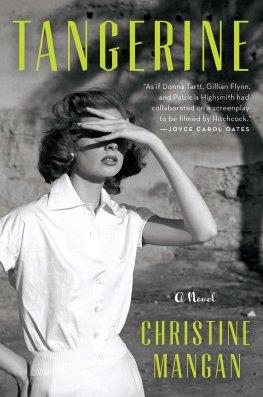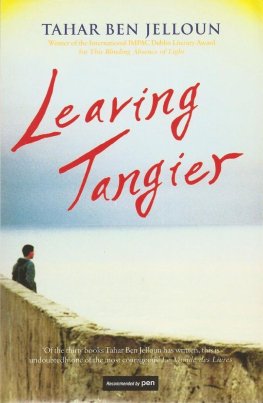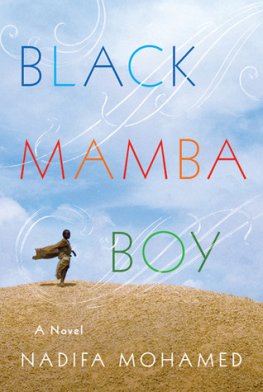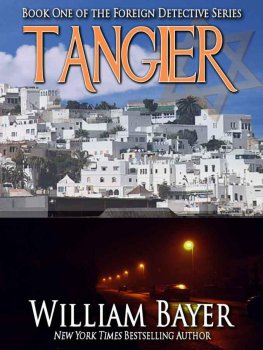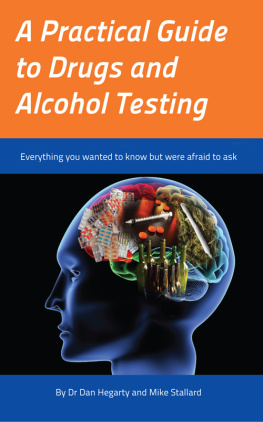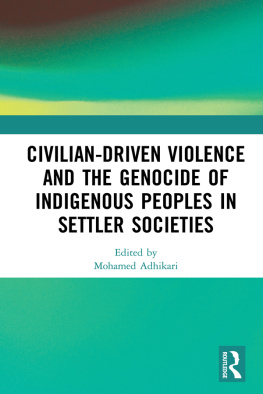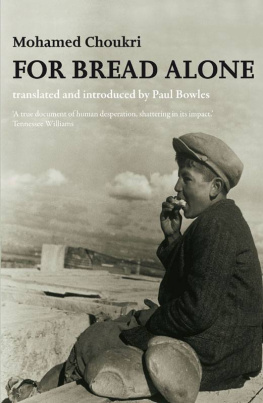Mohamed Choukri
FOR BREAD ALONE
Translated and with an Introduction by
Paul Bowles
TELEGRAM
Introduction
Because I have translated several books from the Arabic I want to make a clear differentiation between the earlier volumes and the present work. The other books were spoken onto tape and the words were in the colloquial Arabic called Maghrebi. For Bread Alone is a manuscript, written in classical Arabic, a language I do not know. The author had to reduce it first to Moroccan Arabic for me. Then we used Spanish and French for ascertaining shades of meaning. Although exact, the translation is far from literal.
It has been my experience that the illiterate, not having learned to classify what goes into his memory, remembers everything. This too is a technique. Total recall is like perfect pitch: it means nothing in itself, but it can be extremely helpful to the writer who uses it professionally. It seems almost a stroke of good luck that Choukris encounter with the written word should have come so late, for by then his habits of thought were already fully formed; the educative process did not modify them. As a writer, then, he is in an enviable position, even though he paid a high price for it in suffering.
Choukri grew up under conditions of poverty excessive even for Morocco. Eight of his brothers and sisters died of malnutrition and neglect. Another brother was killed outright by Choukris father in an access of hunger and desperation. Mohamed and one or two others managed to survive, even under these worst possible circumstances. For Bread Alone records his struggle for survival, up to the time the young man made the resolve to become literate. To have taken and implemented such a decision at the age of twenty is unusual.
To have passed in the space of five years from learning the letters of the alphabet to writing poems and stories is even more unexpected.
Paul Bowles
Morocco 1973
Glossary
aaita: a card game
alpargatas: old-fashioned Spanish canvas slippers
baqal: a grocer or grocery
bodega: a Spanish tavern
cargador (pl. cargadores): a hand-porter
dfin: a womans garment of sheer material, worn over the caftan
djellaba: a long, hooded garment worn by men and women
djinn (pl. djenoun): a spirit able to appear in human and animal forms, and having supernatural power over human beings
fjer: the pre-dawn prayer at the mosque
hammam: a public bath
harira: a thick soup
jefatura: the central police station
kif: a type of hashish found in North Africa
limonada: bottled soda water flavoured with lemon
mahia: an eau de vie, generally made from figs or dates, distilled by the Moroccan Jews
majoun: a paste made of hashish
maricn (pl. maricones): an effeminate man; homosexual
paseo: a walk or stroll; a drive
qahouaji: a man who prepares and serves tea (or coffee) in an Arab caf
sala: sitting-room
sebsi: a kif pipe
surah (pl. surat): a version of the Koran
taifor: a very low, round table
tajine: a stew
tapas: hors doeuvres served with drinks in Arab and Spanish cafs
tas: a washing basin brought to the table before a meal
tolba: Koranic students
zib: penis
zigdoun: a womans garment, akin to a Mother Hubbard
A Note on Pronunciation
English-speaking readers should note that the ch in North African words is pronounced as sh in English (e.g. Choukri and Larache are pronounced Shoukri and Larashe).
1
S urrounded by the other boys of the neighbourhood, I stand crying. My uncle is dead. Some of them are crying, too. I know that this is not the same kind of crying as when I hurt myself or when a plaything is snatched away. Later on I began to see that many people cried. That was at the time of the great exodus from the Rif. There had been no rain, and as a result there was nothing to eat.
One afternoon I could not stop crying. I was hungry. I had sucked my fingers so much that the idea of doing it again made me sick to my stomach. My mother kept telling me: Be quiet. Tomorrow were leaving for Tangier. Theres all the bread you want there. You wont be crying for bread any more, once we get to Tangier.
My little brother Abdelqader was too sick to cry as I did. Look at your little brother, she told me. See how he is. Why cant you be like him?
I stare at his pallid face and his sunken eyes and stop crying. But after a few moments I forget to be inspired by his silence, and begin once more to cry.
When my father came in I was sobbing, and repeating the word bread over and over. Bread. Bread. Bread. Bread. Then he began to slap and kick me, crying: Shut up! Shut up! Shut up! If youre hungry, eat your mothers heart. I felt myself lifted into the air, and he went on kicking me until his leg was tired.
We were making our way towards Tangier on foot. All along the road there were dead donkeys and cows and horses. The dogs and crows were pulling them apart. The entrails were soaked in blood and pus, and worms crawled out of them. At night when we were tired we set up our tent. Then we listened to the jackals baying.
When someone died along the road, his family buried the body there in the place where he had died. After we had set out Abdelqader began to cough, and the cough grew worse as we went along. Fearful for his sake and my own, I said to my mother:
Will Abdelqader die too?
No, of course not. Who said he was going to die?
My uncle died.
Your brothers not going to die. Hes sick, thats all.
I did not see as much bread in Tangier as my mother had promised me I should. There was hunger even in Eden, but at least it was not a hunger that killed. One day when the hunger had grown too strong, I went out to An Ketiout to look in the garbage dump for bones and ends of dry bread. I found another boy there before me. He was barefoot and his clothes were in shreds. His scalp was covered with ringworm, his arms and legs scarred with sores.
The garbage in the middle of town is a lot better than it is here, he said. Nazarene garbage is the best.
After that I wandered further afield in search of food, sometimes alone, sometimes with another boy who was looking for the same thing. One day I found a dead hen. I seized it and hugged it close, for fear someone would snatch it away.
Mother in the city, Abdelqader propped against the cushions. His huge eyes, half shut, watched the entrance door. He sees the hen, and his eyes open wide. He smiles, his thin face flushes, he moves, coughs. I find the knife. I turn towards the east, as my mother always does when she is about to pray.
I said: Bismillah. Allahou akbar. And I kill it as I have seen grown-ups do it.
I drew the knife back and forth across its throat until its head fell off. I was waiting to see the blood come out.
I massage the bird a little. Maybe it will come out now.
A few drops of blackish blood appeared in its open gullet. In the Rif I had watched them kill a sheep. They put a bowl under its throat to catch the blood. When the bowl was full they gave it to my mother, who was sick in bed. They held her down and made her drink it. Her face and clothing were smeared with it. Why doesnt the blood come out of the hen the way it did with the sheep?

